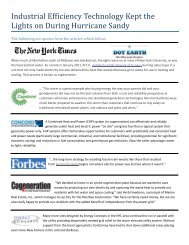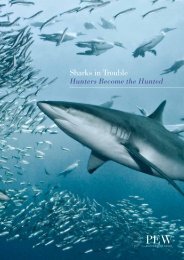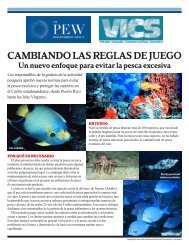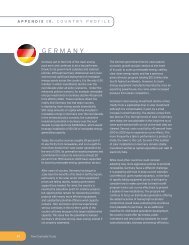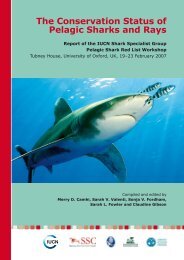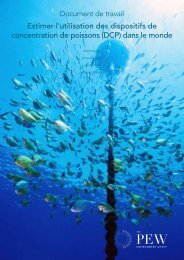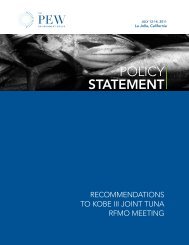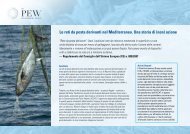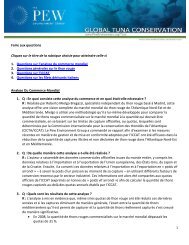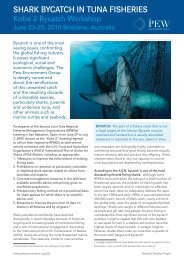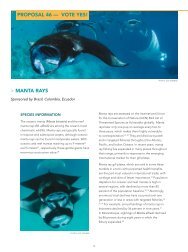Sustainable Fisheries Resolution, November 2012 - The Pew ...
Sustainable Fisheries Resolution, November 2012 - The Pew ...
Sustainable Fisheries Resolution, November 2012 - The Pew ...
Create successful ePaper yourself
Turn your PDF publications into a flip-book with our unique Google optimized e-Paper software.
67th Session of the<br />
United Nations General Assembly<br />
POLICY<br />
STATEMENT<br />
<strong>Sustainable</strong> <strong>Fisheries</strong> <strong>Resolution</strong><br />
<strong>November</strong> <strong>2012</strong>
PoLICY<br />
STATEMENT<br />
<strong>The</strong> <strong>Pew</strong> Environment Group urges the United Nations General Assembly (UNGA) to honor countries’<br />
universal commitment to achieving sustainable global fisheries by agreeing in this year’s <strong>Sustainable</strong><br />
<strong>Fisheries</strong> resolution to implement effective conservation and management measures worldwide.<br />
Ensuring sustainable fisheries is crucial to the conservation of biodiversity in the oceans and<br />
sustainable development ashore. <strong>The</strong> livelihoods of up to 820 million people, and the food security<br />
of some 3 billion people, currently depend on fishing. 1 <strong>The</strong>se numbers will only grow as global fish<br />
production is expected to increase 15 percent by the year 2021. 2<br />
Yet the future of wild fish is in doubt. <strong>The</strong> UN Food and Agriculture Organization (FAO) reports that<br />
“the state of world marine fisheries is worsening and has had a negative impact on fishery production:”<br />
Overexploitation not only causes negative ecological consequences, but it also reduces<br />
fish production, which further leads to negative social and economic consequences.<br />
To increase the contribution of marine fisheries to the food security, economies and<br />
well being of coastal communities, effective management plans must be put in place<br />
to rebuild overexploited stocks. <strong>The</strong> situation seems more critical for some highly<br />
migratory, straddling and other fishery resources that are exploited solely or partially in<br />
the high seas. 3<br />
Recognizing this problem, the <strong>2012</strong> United Nations Conference on <strong>Sustainable</strong> Development<br />
(Rio+20) unanimously reaffirmed the 2015 goal, as agreed to in the Johannesburg Plan of<br />
Implementation (JPOI), to restore depleted stocks. Further commitments were made to urgently<br />
take measures necessary to maintain or restore stock to at least levels that can produce maximum<br />
sustainable yield—a minimum standard of sustainability. 4 With only three years to 2015, urgent<br />
action is needed to protect the future of wild fish and associated species.<br />
Achieving <strong>Sustainable</strong> <strong>Fisheries</strong><br />
For many decades, the sustainability of fish stocks has been measured against the yardstick of<br />
“maximum sustainable yield,” or MSY. <strong>Fisheries</strong> managers pursued the ideal of allowing fishing at<br />
the highest possible rate a particular population could be expected to withstand in the long-term.<br />
<strong>The</strong> goal of permitting fishing at rates likely to achieve MSY was widely embraced by the<br />
international community, and was incorporated into several important international agreements<br />
including the U.N. Convention on the Law of the Sea (UNCLOS).<br />
I 2
PoLICY<br />
STATEMENT<br />
Today it is widely recognized that managing fisheries with the aim of reaching MSY too often<br />
results in unsustainable practices. Managing for MSY leaves no room for error—setting fishing<br />
levels above MSY, by definition, results in overexploitation and declines of target stocks. Yet<br />
fisheries management is fraught with uncertainties about actual catch levels, the health and size of<br />
target stocks, natural environmental fluctuations, and increasing stresses on the marine<br />
environment. Managing one stock for MSY also ignores the wider effects of fishing for that stock<br />
on the non-target species, or the ecosystem as a whole. For example, high value fish stocks, such<br />
as tuna, rely on forage fish like anchovy, for food. Managing forage fish for MSY, as compared with<br />
setting forage fish catch limits well below MSY, very often will have adverse effects on those higher<br />
value fish stocks. In addition, managing tuna for MSY without also taking into consideration the<br />
impact on non-target, bycatch species such as sharks, can have negative impacts as well.<br />
Acknowledging these shortcomings, the international community agreed in the 1995 U.N. Fish<br />
Stocks Agreement (UNFSA) to do better. Governments agreed to apply a more precautionary and<br />
ecosystem-based approach to managing fish stocks on the high seas. This approach, based on<br />
target and limit reference points, is designed to account for uncertainty and keep fishing safely<br />
within sustainable limits. Countries at Rio+20 likewise agreed to raise the bar on MSY, committing<br />
themselves to achieving “at least” MSY for all fisheries by 2015 as agreed to in the Johannesburg<br />
Plan of Implementation (JPOI). 5<br />
To meet the goal of sustainable fisheries and healthy and resilient ocean ecosystems,<br />
<strong>Pew</strong> urges the UNGA to:<br />
Reaffirm that States and RFMOs need to apply the precautionary principle and ecosystem<br />
approach to managing global fish stocks so as to ensure they are all sustainable, including by<br />
establishing science-based target and limit reference points for the fisheries they manage.<br />
Accountability to the UNGA<br />
States and RFMOs have great responsibility for the conservation and management of global fish<br />
stocks. Yet the status of many of those stocks continues to worsen. As Rio+20 recognized, with this<br />
responsibility comes “the need for transparency and accountability in fisheries management by<br />
[RFMOs].” 6 <strong>The</strong> UNGA should hold States and RFMOs accountable for achieving the goal of<br />
sustainable global fisheries by reviewing their progress towards meeting that goal every year.<br />
History demonstrates that when the UNGA has set fisheries management goals, and reviewed the<br />
actions taken to implement those goals, real progress has been made to achieve them. This can be<br />
seen in the UNGA’s efforts to end large-scale pelagic driftnet fishing and destructive bottom<br />
fishing practices. Each UNGA intervention prompted a flurry of actions designed to show progress<br />
that would not have occurred had the UNGA not continued to insist that the goals be met.<br />
I 3
PoLICY<br />
STATEMENT<br />
Given the current perilous state of global fish stocks, and in order to help turn the<br />
goal of sustainable fisheries into a reality, the UNGA should:<br />
• Conduct annual reviews focused on the progress States and RFMOs are making to meet<br />
the goal of sustainable fisheries, with a view towards calling on States and RFMOs to<br />
implement additional measures in areas where fisheries are not being managed<br />
sustainably. Measures to be considered should include:<br />
• the need for science-based total allowable catch (TAC) limits for target species,<br />
including setting target and limit reference points;<br />
• the application of the ecosystem approach and precautionary principle;<br />
• bycatch reduction measures;<br />
• the application of port State measures and flag State responsibilities;<br />
• capacity reduction;<br />
• elimination of subsidies that contribute to overcapacity or overfishing;<br />
• and the suspension or restriction of fisheries that are not sustainable or managed<br />
based on sound science; and<br />
• Call on the 2015 UN Fish Stocks Agreement Resumed Review Conference to transparently<br />
review the performance of States and RFMOs in meeting their obligations to manage<br />
fisheries sustainably by implementing the precautionary principle and ecosystem approach.<br />
Combating IUU Fishing<br />
Illegal, unreported, and unregulated (IUU) fishing robs the ocean, and coastal and developing<br />
States of billions of dollars worth of fish every year, and is a major driver of the overexploitation of<br />
global fish stocks. As the international police organization INTERPOL describes it:<br />
<strong>Fisheries</strong> crime undermines resource conservation, threatens food security and<br />
livelihoods, is linked to up and down-stream crimes including money laundering, fraud,<br />
human trafficking and drug trafficking, and is destabilizing vulnerable coastal regions,<br />
such as West Africa, due to its close links with corruption. 7<br />
Countries at Rio+20 recommitted themselves to “eliminate” IUU fishing through the<br />
implementation of effective and coordinated measures by coastal States, flag States, port States,<br />
chartering nations and the States of nationality of the beneficial owners and others who support or<br />
engage in IUU fishing. 8<br />
As part of the strategy to address some of this problem, countries negotiated the Agreement on<br />
Port State Measures to Prevent, Deter and Eliminate Illegal, Unreported and Unregulated Fishing<br />
(PSMA) under the auspices of the Food and Agriculture Organization of the UN (FAO) in 2009. <strong>The</strong><br />
PSMA contemplates that fishing and support vessels will transmit information about their<br />
operations to the port State before entering ports, and that port States will deny port access to<br />
such vessels if there is evidence of IUU fishing.<br />
I 4
PoLICY<br />
STATEMENT<br />
A serious obstacle in the battle against IUU fishing and fisheries crime more generally, is the lack<br />
of access to transparent and authoritative data about the identity, flag, ownership, and<br />
operations of fishing vessels. This information can currently be easily changed and disguised by<br />
a vessel owner, making it very difficult for authorities to identify vessels and link them to their<br />
history or beneficial ownership. Vessels need to be identified by a unique number, allocated as<br />
part of a single global system. Just as is currently available for merchant vessels through their<br />
use of IMO (International Maritime Organization) numbers, fishing vessels — at least those of a<br />
class over a certain size or fishing in international waters — should also be required to have an<br />
IMO number. This number should also be the basic building block of the development by the<br />
FAO of a “Global Record” of fishing vessels.<br />
IUU fishing often amounts to or is linked to criminal activity. In February <strong>2012</strong>, INTERPOL<br />
established an ad hoc <strong>Fisheries</strong> Crime Working Group (FCWG) that is working to highlight<br />
problems and improve information-sharing and cooperation among national law enforcement<br />
agencies to enable them to better interdict fisheries crime. <strong>The</strong> United Nations Office on Drugs<br />
and Crime (UNODC) has continued to make progress in its assessment of transnational<br />
organized crime in the fishing industry, and requested that an expert meeting be convened to<br />
survey the challenges arising from organized criminal activities at sea. 9<br />
Building on these outcomes and agreements, the UNGA should:<br />
• Call on States that have not yet done so to ratify and become parties to the PSMA;<br />
• Call on RFMOs to require its members and States whose vessels fish within its area to<br />
adopt port State measures consistent with the PSMA;<br />
• Call on flag States to mandate the use of IMO numbers for fishing vessels 100 gross<br />
tonnes or greater (or 24 meters in length or greater), as well as all vessels operating in<br />
areas beyond national jurisdiction;<br />
• Call on RFMOs to require that all vessels 100 gross tonnes or greater (or 24 meters in<br />
length or greater) authorized to fish in their regulatory area have an IMO number;<br />
• Welcome INTERPOL’s efforts to improve national law enforcement capacities to combat<br />
fisheries crime; and<br />
• Welcome progress by the UNODC in its assessment of transnational organized crime in<br />
the fishing industry, and request that an expert meeting be convened in 2013 to survey<br />
the challenges arising from organized criminal activities at sea.<br />
I 5
PoLICY<br />
STATEMENT<br />
Shark Conservation<br />
Sharks are particularly vulnerable to overexploitation because they grow slowly, mature late, and<br />
produce few young at one time. Of the shark and ray species assessed by scientists for the<br />
International Union for Conservation of Nature (IUCN), 30 percent are considered Threatened or<br />
Near Threatened with extinction.<br />
In 1999, the FAO adopted the International Plan of Action for the Conservation and Management<br />
of Sharks (IPOA-Sharks). <strong>The</strong> IPOA-Sharks recommends that countries whose vessels fish for<br />
sharks assess whether the fishery is sustainable and develop National Plans of Action<br />
(NPOA-Sharks) to monitor shark stocks and implement management measures designed to<br />
make the fishery sustainable.<br />
Some developing countries have recently established shark sanctuaries in their Exclusive Economic<br />
Zones (EEZs), in which commercial exploitation of sharks is restricted or prohibited. Unfortunately,<br />
those countries need more assistance to effectively implement their sanctuaries. Also, many of the<br />
countries with the largest shark fisheries have not implemented conservation or management<br />
measures adequate to ensure sustainability. At the FAO Committee on <strong>Fisheries</strong> (COFI) meeting in<br />
July <strong>2012</strong>, the FAO presented a review on the implementation of the IPOA-Sharks and the<br />
challenges faced by countries in implementing that instrument. While this review showed some<br />
progress in implementation, COFI recognized that further actions by States and regional fisheries<br />
management organizations (RFMOs) are needed for shark conservation and management.<br />
<strong>The</strong> UNGA should:<br />
• Welcome the growing support by many coastal and small island developing States for the<br />
protection and conservation of sharks, including the establishment of their waters as fully<br />
protected shark sanctuaries, and encourage other countries to assist in those efforts and<br />
take similar action to protect and conserve sharks in their waters;<br />
• Call on shark-fishing States to develop and fully implement an NPOA-Sharks that is<br />
consistent with the IPOA-Sharks;<br />
• Call on FAO COFI to adopt an ongoing and transparent mechanism to monitor progress<br />
of the implementation of the principles of the IPOA-Sharks;<br />
• Call on States and RFMOs to prohibit the take of threatened species of sharks, as<br />
assessed by IUCN and to only allow fishing for other shark species if the fishing is<br />
conducted under a precautionary science-based management plan that ensures<br />
sustainability;<br />
• Call upon States and RFMOs that have not yet done so to establish and implement<br />
species-specific data collection requirements for all sharks taken in all fisheries; and<br />
• Recommend that Parties to the Convention on International Trade in Endangered Species<br />
of Wild Fauna and Flora (CITES) support including additional Threatened shark species on<br />
CITES Appendices I or II, as appropriate for the status of the species.<br />
I 6
PoLICY<br />
STATEMENT<br />
Sustaining Forage Fish<br />
Forage fish, such as herring, sardine, menhaden, and anchovy, are a critical link in the marine food<br />
chain. <strong>The</strong>y feed on plankton, converting it into energy and protein for predator species at the top<br />
of the food chain, such as tuna, mackerel, cod, seabirds, and whales.<br />
Forage fish make up more than a third of the total global marine fish catch by weight. 10 However,<br />
only about 10 percent of this is consumed directly by humans. <strong>The</strong> remaining 90 percent is<br />
processed into fish oil, fish meal, and other byproducts for use in agriculture, aquaculture, and<br />
industry. Rapid growth of aquaculture, in particular, has increased consumption of fish meal,<br />
resulting in unsustainable pressure on the world’s forage fish stocks.<br />
Forage fish experience wide natural population variability and can easily be caught en masse,<br />
making them vulnerable to overexploitation and sudden collapse. Historically, forage fish were<br />
thought to be so abundant that overfishing was impossible. But by the end of the 20th century,<br />
many of the world’s herring, sardine, and anchovy fisheries had collapsed due to overfishing. 11<br />
Forage fisheries also affect other fisheries, since many commercially and recreationally valuable<br />
species are highly dependent upon forage fish. However, the food needs of the larger ecosystem are<br />
not adequately accounted for before fishing quotas are set. Predators are often far more economically<br />
valuable in the marketplace; whereas forage fish are used mainly for low value fishmeal and fish oil,<br />
some predators are used for high-value food like sashimi. It is estimated that the global economic<br />
value of forage fish as prey for other commercial fisheries is twice their direct value as catch. 12<br />
Traditional single species fisheries management, which seeks to achieve MSY, poses substantial<br />
risks to forage fish as well as their predators. This is due to the uncertainties inherent in all fisheries<br />
management, but also to the special vulnerabilities of forage fish. Recent research found that<br />
management based on MSY poses a high risk of forage fish population collapse and can cause<br />
significant declines of dependent predators. Two recent expert reports have concluded that to<br />
sustain marine ecosystems, exploitation rates for many forage fisheries should be reduced to half<br />
the maximum under conventional MSY management. 13 In ecosystems where uncertainty is greater,<br />
existing forage fisheries should take at most 20 percent of the virgin biomass, and no new forage<br />
fisheries should be allowed. 14<br />
<strong>The</strong> UNGA should:<br />
• Call on States and RFMOs to manage forage fisheries to sustain both forage fish stocks<br />
and their predators;<br />
• Call on States and RFMOs to implement precautionary measures to limit forage fisheries,<br />
imposing more conservative limits where uncertainty is greater;<br />
• Call on States and RFMOs to suspend the development of new forage fisheries until<br />
scientific knowledge and management measures can ensure such fisheries will not harm<br />
the ecosystems in which they occur; and<br />
• Call on States and RFMOs to implement spatial and temporal forage fishery closures as<br />
needed to support critical predator foraging locations and times, such as around sea bird<br />
rookeries during nesting season.<br />
I 7
PoLICY<br />
STATEMENT<br />
Securing <strong>Sustainable</strong> Tuna <strong>Fisheries</strong><br />
Tuna fisheries are among the world’s most valuable, yet tuna are fished unsustainably in many regions.<br />
Many tuna fisheries make use of FADs, or “Fish Aggregating Devices,” which are artificial structures<br />
that attract schools of tuna. FAD use has greatly increased over the last 30 years. Tens of thousands<br />
are deployed every year in the world’s oceans, without any limits or effective management of FAD<br />
impacts. 15 In fact, this fishing gear is responsible for more tuna catch than any other. While FAD<br />
fishing can be a fast method for catching large schools of tuna, FADs disproportionately attract<br />
juvenile fish and non-target species, and their impact on the broader marine ecosystem is unknown.<br />
Some RFMOs have limited measures in place aimed at managing the impacts of FAD fisheries, such<br />
as the West and Central Pacific <strong>Fisheries</strong> Commission (WCPFC) ban on FAD use for three months of<br />
the year. But to date these measures have not achieved the objective of ensuring sustainable tuna<br />
fisheries; for example, 2011 saw the highest rate of FAD fishing on record in the WCPFC Convention<br />
Area and bigeye tuna continue to be overfished in the western and central Pacific as a result. 16<br />
Approximately 14% of the world’s tuna are caught on longlines—lines with baited hooks that are<br />
strung at evenly spaced intervals along a central fishing line that can be up to 100 km in length.<br />
Longlines are responsible for significant bycatch and mortality of marine turtles, sharks, marine<br />
mammals, and seabirds. Sharks make up a quarter of the total catch in some pelagic longline tuna<br />
fisheries, and thus constitute an unmanaged and largely unreported fishery. A high level of<br />
observer coverage is critical to the management of these longline fisheries, but currently less than<br />
5% of all RFMO-managed longline tuna vessels have observers.<br />
Tuna are also fished using large driftnets suspended in the water column. Drift netting is another<br />
fishing method capable of rapidly catching large schools of tuna, but it too often also kills<br />
dolphins, marine turtles, and other vulnerable marine species. <strong>The</strong> UNGA agreed to ban drift<br />
netting by the end of 1992. 17 <strong>The</strong> UNGA ban led to action by States and RFMOs to ban the use of<br />
driftnets, and significant reductions in drift netting. However, some driftnets remain in use, in<br />
violation of the UNGA ban and national legislation 18<br />
<strong>The</strong> UNGA should:<br />
• Call on States and RFMOs to take measures that effectively manage the impacts of FADs<br />
on target as well as associated species;<br />
• Call on RFMOs to review studies of the impacts of FADs on the sustainability of target and<br />
non-target fish stocks so as to adopt effective measures consistent with the precautionary<br />
principle and ecosystem approach to manage this destructive fishing gear;<br />
• Call on RFMOs to inventory, track, manage, and limit the deployment and uses of FADs<br />
under their jurisdiction, and develop measures to remove decommissioned FADs;<br />
• Call on RFMOs to immediately adopt precautionary catch limits, including target and limit<br />
reference points that account for the overfishing of juvenile tunas and bycatch associated<br />
with FAD use;<br />
• Reaffirm the moratorium on drift netting; and<br />
• Call on States and RFMOs to increase observer coverage on longline fishing vessels.<br />
I 8
PoLICY<br />
STATEMENT<br />
Eliminating Harmful <strong>Fisheries</strong> Subsidies<br />
Public subsidies account for nearly a third of the global fishing industry’s revenues each year. 19<br />
<strong>The</strong>se subsidies are a significant contributor to overcapacity and unsustainable fisheries<br />
worldwide. <strong>The</strong> FAO estimates that eliminating fisheries subsidies would increase the profitability<br />
of the fishing industry as well as the biomass of commercial fish species. 20<br />
To achieve sustainable fisheries, Rio+20 called for an end to subsidies that contribute to<br />
overcapacity and overfishing, and to refrain from introducing new such subsidies. 21 <strong>The</strong> Conference<br />
of the Parties to the Convention on Biological Diversity likewise agreed that harmful fisheries<br />
subsidies should be ended by 2020:<br />
By 2020, at the latest, incentives, including subsidies, harmful to biodiversity are<br />
eliminated, phased out or reformed in order to minimize or avoid negative impacts, and<br />
positive incentives for the conservation and sustainable use of biodiversity are developed<br />
and applied, consistent and in harmony with the Convention and other relevant<br />
international obligations, taking into account national socio economic conditions. 22<br />
<strong>The</strong> UNGA should:<br />
• Welcome and urge States to implement the Rio+20 decision to end fisheries subsidies<br />
that contribute to overcapacity and overfishing, and to refrain from introducing new<br />
such subsidies;<br />
• Support the CBD goal of ending harmful fisheries subsidies and promoting positive<br />
incentives for the conservation and sustainable use of fisheries by 2020; and<br />
• Urge the World Trade Organization (WTO) to complete its negotiations on strengthening<br />
disciplines on fisheries subsidies, taking into account the importance of the fisheries<br />
sector, including small-scale and artisanal fisheries, to developing countries.<br />
Deep-Sea <strong>Fisheries</strong><br />
<strong>The</strong> largest and least explored environment on the planet is the deep sea. Deep-sea fish and<br />
ecosystems have evolved a unique suite of biological characteristics to adapt to this otherwise<br />
inhospitable environment. Those characteristics are of great interest to science and the<br />
biotechnology industry.<br />
But these deep sea species are uniquely vulnerable to fishing. <strong>The</strong>y tend to be slow growing, long<br />
lived, and reproduce late in life. Deep-sea corals, sponges and other habitat forming species are<br />
particularly vulnerable to damage caused by bottom trawling. Deep-sea fish species often aggregate<br />
I 9
PoLICY<br />
STATEMENT<br />
around the peaks of seamounts, which makes them easy targets for sophisticated fishing technology.<br />
In the worst case, deep-sea bottom trawlers scour the sea floor with giant nets, grinding away<br />
important bottom habitats while indiscriminately catching everything in their path.<br />
To respond to the problems of deep-sea bottom fisheries in areas beyond national jurisdiction, the<br />
UNGA adopted resolutions 59/25, 61/105, 64/72, and 66/68, that reaffirm the obligations under<br />
UNCLOS and related instruments that environmental impact assessments must be conducted<br />
before potentially destructive activities are authorized, and that those activities must be managed<br />
to prevent significant adverse environmental impacts. <strong>The</strong>se resolutions require that bottom<br />
fishing not be authorized until an impact assessment has been done, and precautionary<br />
management measures are implemented to mitigate any significant adverse impacts. <strong>The</strong> UNGA<br />
resolutions have also endorsed and incorporated a set of International Guidelines for the<br />
Management of Deep-Sea <strong>Fisheries</strong> in the High Seas negotiated under the auspices of the UN<br />
FAO (Guidelines), which describe how prior impact assessments should be conducted and how to<br />
implement effective conservation and management measures.<br />
<strong>The</strong> UNGA should:<br />
• Reaffirm its commitment to <strong>Resolution</strong>s 59/25, 61/105, 64/72 and 66/88 and the<br />
Guidelines; and<br />
• Urge States and RFMOs to adopt regulations and other measures to fully implement<br />
<strong>Resolution</strong>s 59/25, 61/105, 64/72 and 66/88.<br />
I 10
PoLICY<br />
STATEMENT<br />
Shoal of Mackerel Fish in Ocean, © shutterstock/Rich Carey<br />
I 11
PoLICY<br />
STATEMENT<br />
Endnotes<br />
1 FAO. <strong>The</strong> State of World <strong>Fisheries</strong> and Aquaculture <strong>2012</strong> [“SOFIA <strong>2012</strong>”]. Rome, FAO. <strong>2012</strong>. pp. 5, 10.<br />
2 Id., p. 188.<br />
3 Id., p. 59.<br />
4 “<strong>The</strong> Future We Want”, A/66/L.56 [Rio+20 Outcome], 168 (24 July <strong>2012</strong>).<br />
5 Rio+20 Outcome, 168.<br />
6 Rio+20 Outcome, 172.<br />
7 INTERPOL, International Chiefs of Environmental Compliance and Enforcement meeting in Lyon, France (27-29 March <strong>2012</strong>), Summit Report, p. 28.<br />
8 Rio+20 Outcome, 170.<br />
9 <strong>Resolution</strong> 20/5, Combating the problem of transnational organized crime committed at sea, Commission on Crime Prevention and Criminal Justice,<br />
UN Doc. E/CN.15/2011/21. See also UNODC issue paper “Transnational Organized Crime in the Fishing Industry: Focus on Trafficking in Persons,<br />
Smuggling of Migrants and Illicit Drug Trafficking”, April 2011.<br />
10 Lenfest Forage Fish Task Force, Little Fish, Big Impact, p. 4 (<strong>2012</strong>).<br />
11 Id. at pp. 38, 41, 45, 49, 50.<br />
12 Id. at p. 63.<br />
13 Id. and Smith, A. D. M., et al. (2011). Impacts of fishing low–trophic level species on marine ecosystems. Science, 333(6046), 1147–1150.<br />
14 Lenfest Forage Fish Task Force, Little Fish, Big Impact, at p. 83.<br />
15 http://www.pewenvironment.org/news-room/reports/fish-aggregating-devices-fads-and-tuna-impacts-and-management-options-85899361033<br />
16 Fish Aggregating Devices and Tuna: Impacts and Management Options, <strong>Pew</strong> Ocean Science Series (July 2011), http://www.pewenvironment.org/<br />
uploadedFiles/PEG/Publications/Report/PEG_OSD_FADs_English_Final.pdf.<br />
17 A/RES/46/215 3(c).<br />
18 A/57/459 218.<br />
19 It is estimated that the industry receives approximately US$27 billion in subsidies each year on total direct revenues of approximately US$85 billion. See<br />
UNEP, Towards a Green Economy: Pathways to sustainable development and poverty eradication, at 84 (2011), available at http://www.unep.org/<br />
greeneconomy/GreenEconomyReport/tabid/29846/Default.aspx .<br />
20 SOFIA <strong>2012</strong>, p. 200.<br />
21 Rio+20 Outcome, 173.<br />
22 Report of the Tenth Meeting of the Conference of the Parties. 2010. In particular: Decision X/2 (Strategic Plan for Biodiversity 2011-2020 and the Aichi<br />
Biodiversity Targets), Target 3, at http://www.cbd.int/sp/ and http://www.cbd.int/doc/meetings/cop/cop-10/official/cop-10-27-en.pdf.<br />
Contact: <strong>Pew</strong> Environment Group | international@pewtrusts.org<br />
For additional resources, visit us at www.<strong>Pew</strong>Environment.org/ip.<br />
Philadelphia, Pa. 19103 Washington, D.C. 20004 1050 Brussels, Belgium London WC1HBY United Kingdom<br />
Tel. +1 215-575-2000 Tel. +1 202-552-2000 Tel. +32 (0) 2 274 1620 Tel. +44 (0)20.7250.8204<br />
CoNNECT:<br />
Facebook http://www.facebook.com/<strong>Pew</strong>EnvironmentGroup<br />
Twitter http://www.twitter.com/<strong>Pew</strong>Environment<br />
YouTube http://www.youtube.com/user/<strong>Pew</strong><br />
ABOUT THE PEW ENVIRONMENT GROUP<br />
<strong>The</strong> <strong>Pew</strong> Environment Group is the conservation arm of <strong>The</strong> <strong>Pew</strong> Charitable Trusts, a non-governmental organization that works<br />
globally to establish pragmatic, science-based policies that protect our oceans, preserve our wildlands and promote clean energy.



